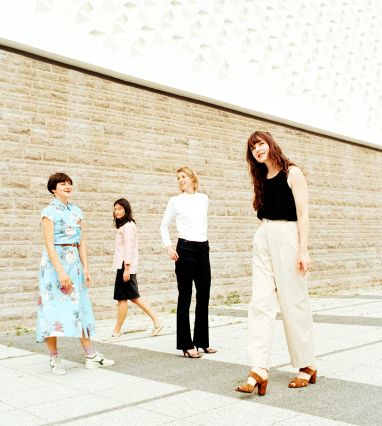Als Politik zur Show wurde - Deutsche Oper Berlin
The day politics became show business
John Adams’s NIXON IN CHINA is widely considered a masterpiece of the minimal music genre. The work is now set to make its debut in Berlin in a production by the »Hauen und Stechen« musical theatre collective.
On 21st February 1972, at prime time for US television viewers, Air Force One touched down in Peking, the start of a week-long visit to the People’s Republic of China - the first by an American president – and a huge media circus. Media interest was afterwards described as having been bigger than the hubbub around the moon landing three years earlier. Affairs of state did not feature prominently in the conversations. There were photo sessions with Mao Tse-tung and one-to-one talks with Premier Zhou En-lai, but the general public was given only pictures of the encounter. Propaganda raged in the immediate aftermath, but the general impression was of a diplomatic success. Nixon’s visit marked the beginning of US-China rapprochement.
15 years later the event was given artistic form by the composer John Adams. From the beginning his 3-act NIXON IN CHINA was intended as a »heroic opera«, not as a parody or clunky satire. Alice Goodman’s libretto draws on the hectic tourism schedule that the Nixons and National Security Advisor Henry Kissinger were put through, which involved visits to the Great Wall, a showcase pig-breeding facility and a factory producing miniature elephants, attendance at a revolutionary opera and a state banquet in the Great Hall of the People.
What slants can be brought to a production of Adams’s opera at the Deutsche Oper Berlin half a century on? A realistic portrayal of 1970s China is not what directors Julia Lwowski and Franziska Kronfoth of »Hauen und Stechen« have in mind. Partly because they’re interested in the inherent and ongoing nature of a confrontation of global relevance, as in the East-West conflict; and partly because the opera itself is deceptively hard to pin down in terms of time and geography. Lwowski: »We have to remember that we look at the real-world locations of historical events through US-tinted spectacles. NIXON IN CHINA is an American work through and through, starting with the music, which has echoes of Broadway at many points, and extending to the language style and character traits.«

The musical aspect will presumably have been one of the reasons why the opera was an international hit. A leading light in the minimal music scene, Adams achieves a deft blend of jazz, Romantic opera and energised musical to complement the disciplined minimalism with its characteristic, repetitive melody and rhythm patterns. »It’s phenomenal music,« says Lwowski, »very evocative. It’s multifaceted without being cumbersome or losing its generous, inclusive quality. I read a lot of passion and erotica into the way the music embraces the listener.«
Lwowski and Franziska Kronfoth created Hauen und Stechen in 2012. With its permanent team of singers, musicians, video artists and set and costume designers, the collective functions as a small-scale opera house. »We’ve gradually arrived at our own form of expression, including the video art that’s a major part of NIXON IN CHINA,« explains Kronfoth. »A lot of the action is tracked by a camera team – in the same way that the original goings-on were captured on film.«
Fifty years after the historic visit the political situation has changed drastically, China having long since become the main rival to the USA, so why is it precisely now that the opera is experiencing a surge of interest? Kronfoth sees parallels with the present: »The indicators are different this time around, but the same sense of collective uncertainty exists today. Once more we’re talking about how the cards of the world order are being reshuffled; we’re worried about a power vacuum emerging. The same socio-psychological mechanisms are in play now, not unlike how they were in play when Nixon began to open the closed book that was China. It may also be that we’re back to the old disconnect between the two systems and philosophies, despite our tight-knit trade relations. That kind of thing makes opera timeless.«
Transcript by Tilman Mühlenberg





